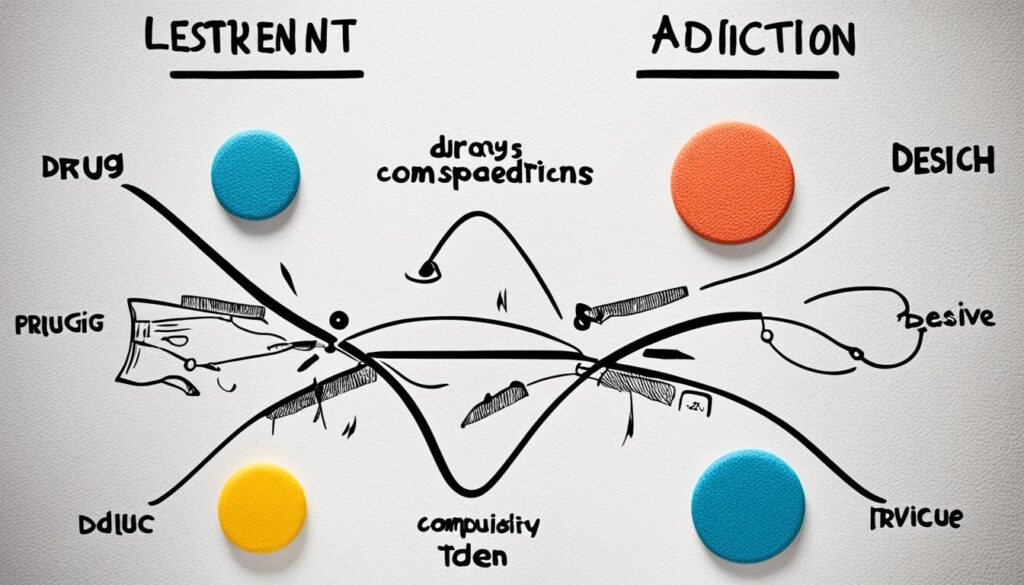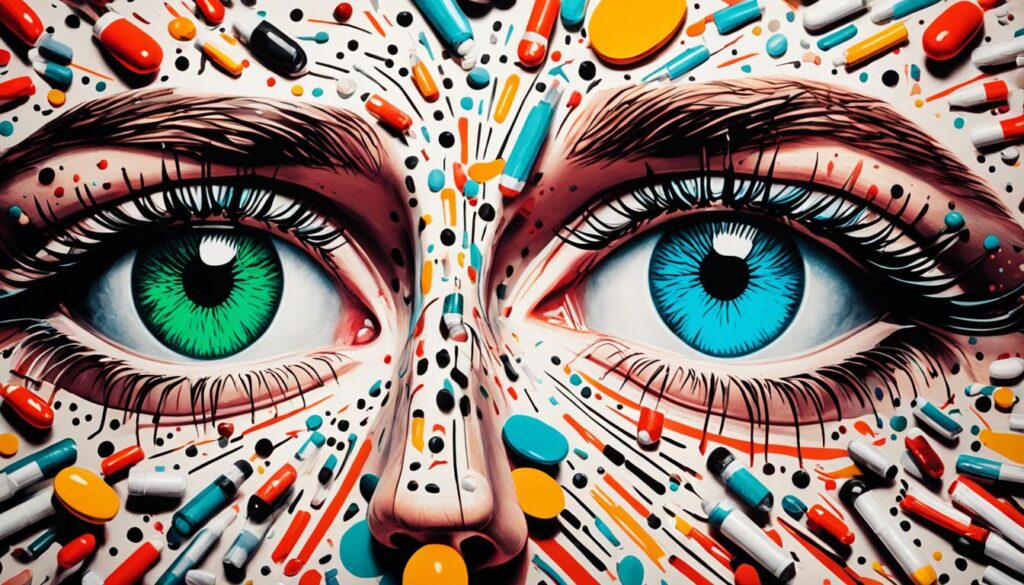Drug dependence affects millions in the U.S. The National Institute on Drug Abuse says about 22.7 million Americans need help for drug or alcohol issues. The term has changed to “substance use disorder” to better understand the issue.
Knowing about the causes, symptoms, and treatments is key for those facing substance abuse or addiction. The Jellinek Curve shows how people move through drug use stages. This knowledge helps in finding the right strategies for recovery.
Recovery is possible with the right support and resources. It’s important to recognize the signs and get help when needed.
Key Takeaways
- Drug dependence is linked to genetics and environment.
- Withdrawal symptoms include anxiety, nausea, and muscle weakness.
- Knowing the difference between dependence and addiction helps in treatment.
- Community support is crucial for overcoming substance use disorders.
- Professional help is often needed to manage cravings and withdrawal.
Understanding Drug Dependence
Drug dependence, also known as substance use disorder, is a condition that causes significant problems or distress. It can happen to anyone. In the UK, about one in three people aged 16 to 59 have tried drugs at least once. And one in ten used drugs in the last year. These facts show how common drug dependence is and its risks.
Looking closer at understanding drug dependence, we see it’s complex. Factors like age, gender, and genetics play a big role. Men are more likely to be involved with drugs than women. Also, about 70% of kids with parents who have substance use disorders might develop the same issues, showing a strong genetic link.
Kids who act impulsively or seek thrills are more at risk for drug problems. Problems in certain brain areas, like the prefrontal cortex, can make them more vulnerable. Mental health issues, like depression or trouble focusing, also raise the chance of addiction. This shows how closely mental health and drug use are linked.
Knowing the drug dependence risks is key for stopping it before it starts. These risks include starting drugs early, having troubled relationships, and going through tough times. Family history is a big factor, making up about half of the chance of getting addicted. Most people who take drugs as prescribed don’t become addicted, showing the need for careful doctor supervision.
Talking openly and being aware of addiction signs is crucial. Signs include feeling the need to use drugs daily, needing more to get the same effect, and how it affects your life. Spotting these signs early helps in getting the right help. For more on depression and mental health support, check out this resource.
The Difference Between Drug Dependence and Drug Addiction
It’s important to know the difference between drug dependence and drug addiction. These terms are often mixed up, but they mean different things. Drug dependence is when your body needs a substance and you get withdrawal symptoms if you stop. But it doesn’t always mean you can’t control your actions.
Addiction is more about losing control over how much you use substances. People with addiction keep using drugs even when it hurts them. This shows a deeper issue with their mind or behavior. The key difference is not everyone dependent on drugs is addicted.
Many people take drugs for health reasons and don’t act out. This shows how complex the issue of substance use disorder is. In the U.S., over 65% of people in jail have a substance use disorder. Many doctors don’t fully understand the difference between addiction and dependence, which can lead to wrong diagnoses.
Knowing the difference helps us see the wide range of problems with substance use. It shows we need different treatments for different people. As we learn more, understanding this difference is key to helping people with drug issues.

Causes of Drug Dependence
Understanding the causes of drug dependence is key to tackling this issue. Many factors can make someone more likely to develop a substance use disorder. These include both genetic and environmental factors, each playing a big part in how vulnerable someone is to addiction.
Genetic Factors Contributing to Dependence
Studies show that genetics play a big role in addiction, making up about half of the risk. If someone has a family history of addiction, they’re more at risk. Other things like gender, ethnicity, and mental health issues can also affect this risk. Knowing these genetic factors helps doctors find the right treatment.
Environmental Influences and Experiences
Environmental factors are also key in the causes of drug dependence. Being pressured by friends, trying drugs early, or facing stress can all raise the risk of addiction. Things like physical or sexual abuse and how parents guide their kids can also affect someone’s relationship with drugs. Programs that work with families, schools, and communities can help lower drug use and addiction rates.
| Factor Type | Examples | Impact on Dependence |
|---|---|---|
| Genetic Factors | Family history, gender, ethnicity | Increases risk due to inherited traits |
| Environmental Influences | Peer pressure, early drug exposure, trauma | Enhances vulnerability based on life experiences |
For more info on spotting mental health signs, check out this link.
Signs of Drug Dependence
It’s key to spot the signs of drug dependence early for help. Behavioral indicators can show a problem is growing. This can affect someone’s life a lot.
Behavioral Indicators
Signs of drug dependence include:
- Neglecting personal and work tasks
- Withdrawing from family and friends
- Taking risks to get drugs
- Mixing with people who use drugs
- Money troubles from using drugs
Physical Symptoms to Watch For
There are also physical symptoms to look out for. These can get worse when someone tries to stop using drugs. They include:
- Anxiety and getting easily annoyed
- Feeling down and hopeless
- Withdrawal symptoms like feeling sick and body pain
- Changes in eating and sleeping habits

Knowing these signs helps spot people who need help fast. Everyone’s experience is different, and understanding their symptoms helps find the right care. For more on mental health, check out this article on disorders like schizophrenia, which has some similar symptoms to drug use disorders.
Recognizing Symptoms of Withdrawal
When people stop or cut down on a substance after a long time, they may face withdrawal symptoms. It’s key to know these symptoms to help them get the right support. Symptoms vary by substance but often include anxiety, muscle weakness, sweating, nausea, and trouble sleeping. Knowing these signs helps manage the withdrawal process better, making recovery easier.
Telling Signs of Withdrawal Symptoms
Withdrawal symptoms can look different for each substance. Here are some examples:
| Substance | Withdrawal Onset | Duration | Common Symptoms |
|---|---|---|---|
| Alcohol | Within hours | 3-4 days (up to 8 days in rare cases) | Elevated blood pressure, racing pulse, hallucinations, seizures, nausea |
| Heroin | 8-24 hours | 4-10 days | Anxiety, trouble sleeping, diarrhea, muscle cramps |
| Methadone | 2-4 days | 10 days | Similar to heroin withdrawal symptoms |
| Benzodiazepines | 1-4 days | Up to 4 weeks | Anxiety, agitation, trouble sleeping, possible seizures |
| Cocaine | Within 1 day | Several weeks | Severe mood changes, fatigue, increased appetite |
Knowing drug withdrawal symptoms helps people get help from doctors. This makes the withdrawal process safer. People with addiction should watch for these signs and get help fast. This can make recovery much better.

Drug Dependence: Causes, Symptoms, and Treatment
Drug dependence is complex and requires understanding to help those affected. It comes from genetics, environment, and mental health. These factors lead to symptoms that affect daily life and well-being.
Over 20 million people in the U.S. struggle with substance use disorder (SUD). About 38% of these face drug dependence. Mental health issues also play a role, with 20% of those with depression or anxiety also dealing with substance use.
Common signs of drug dependence include using more than planned, craving drugs, and feeling withdrawal symptoms. These signs show the need for help.
Treatments for drug dependence are key to recovery. They range from inpatient to outpatient programs, depending on the substance used and personal needs. These programs often include detox, ongoing care, medical support, and therapy like group support.
Spotting and treating drug dependence symptoms is crucial. Early help can lead to a better recovery. This shows why awareness and understanding are so important.
| Symptoms | Characteristics |
|---|---|
| Increased Tolerance | Need for more substance to achieve the desired effect |
| Cravings | Strong desire to use the substance |
| Withdrawal Symptoms | Physical and mental health issues when not using |
| Impact on Daily Life | Interference with work, school, or home responsibilities |
| Risky Behaviors | Engaging in dangerous situations while under the influence |
Exploring Effective Drug Abuse Treatment Options
Dealing with drug dependence needs a careful plan that includes different treatment options. Before starting a program, think about what you need, your lifestyle, and how bad your dependence is. Most treatment plans mix inpatient and outpatient options. Each type has its own benefits and can greatly affect how well you recover.
Inpatient vs. Outpatient Treatment Programs
Inpatient treatment gives you a structured place where you get care all the time. It’s great for those with serious addiction or mental health issues. On the other hand, outpatient treatment lets you stay home but still go to therapy and support groups. This is good for people with less severe addiction who have a strong support network.
Detoxification and Medication-Assisted Treatments
Detox is a key first step in getting better. It helps manage withdrawal symptoms, making the transition into treatment easier. Medication-assisted treatments add to detox by giving drugs that reduce cravings and lessen withdrawal symptoms.
| Drug/Symptom | Treatment Medication | Type of Disorder |
|---|---|---|
| Alcohol Use Disorder (AUD) | Acamprosate, Disulfiram, Naltrexone | Substance Use Disorder |
| Opioid Use Disorder (OUD) | Buprenorphine, Methadone, Naltrexone | Substance Use Disorder |
| Opioid Overdose | Naloxone, Nalmefene | Emergency Treatment |
Research shows that using medications with therapy can lead to better results. This includes staying in treatment longer and using fewer illegal drugs. Adding medication and therapy to a treatment plan also boosts overall health. When looking into drug abuse treatment options, talking to experts can help create a plan that fits you. This plan should include the right medications, therapies, and support. For more info on mental health and addiction, check out this resource.
Role of Therapy in Addiction Recovery
Therapy is key in overcoming addiction. It helps with behavioral changes and emotional healing. It tackles the addiction and the issues that lead to it. Therapies like cognitive behavioral therapy and group therapy are crucial in this journey.
Cognitive Behavioral Therapy (CBT)
Cognitive behavioral therapy is a major tool in beating addiction. It helps people change negative thoughts that lead to using substances. Through sessions, people learn how to handle cravings and triggers better. CBT is great because it teaches skills to stay sober.
Group Therapy and Support Programs
Group therapy adds a community feel to recovery. It connects people who know what others are going through. These programs offer support and include different types like 12-step facilitation. Sharing stories helps people feel less alone and more resilient.
Using cognitive behavioral therapy and group therapy together helps fully treat addiction. It prepares people for challenges and builds strong support networks. Strong support makes therapy more effective, keeping people engaged in recovery.
Drug Dependence Prevention Strategies
Preventing drug dependence is crucial. By using effective strategies, we can make a big difference. Community programs and family involvement are key to reducing drug use and supporting those at risk.
Community-Based Prevention Programs
Community programs are vital in teaching people about drug risks. They offer resources, promote healthy choices, and encourage talking openly. This helps fight substance abuse and its bad effects.
Family Involvement in Prevention
Family plays a big part in preventing drug dependence. When families learn about drugs, they can talk and support each other. This helps spot risky behaviors early. Strong family bonds protect against drug use.
With community and family efforts, we can fight drug abuse together. Being active in these areas helps people avoid drugs and makes communities stronger. For more on managing stress and anxiety, check out this resource. It shows how mental health is key in preventing drug dependence.
Intervention for Drug Dependence
Intervention is key for those fighting drug dependence. It’s crucial to spot when someone needs help, especially if they can’t see it themselves. Look for signs like poor relationships and health issues. The best time to act is often during a crisis, so plan carefully.
Identifying the Right Time for Intervention
Watch for changes in behavior, withdrawal signs, or a drop in well-being. Family and friends often see mood or behavior shifts that hint at deeper issues. Spotting these moments lets loved ones step in and help.
How to Approach an Intervention
Interventions need to be done with care and a clear plan. Having trusted family and friends there helps a lot, offering support and encouragement. Make sure your approach shows concern but doesn’t make the person defensive. Talking openly and sharing personal stories with love and support works best.
With careful planning and support from loved ones, an intervention can push someone to get help. Include info on drug use, treatment, and community support in your plan. Talking about how stress affects health can also highlight the need for intervention.
Dealing with stress can reduce its negative effects. For tips on managing stress and its health impacts, check out this resource here.
Long-Term Outlook and Recovery
Recovery from drug dependence is a complex journey. It requires a lot of effort and support. People often face many challenges after treatment. That’s why a comprehensive approach is needed to help them keep improving and staying well.
Support is key to long-term recovery. It greatly increases the chances of staying sober.
Managing Relapse and Maintaining Sobriety
It’s important to manage relapse to keep sobriety going. Many people face cravings and triggers that can lead to a relapse. Here are some strategies to help:
- Identifying triggers: Knowing what situations or feelings make you crave can help you avoid or deal with them.
- Building a support network: Being part of groups like Narcotics Anonymous can offer great support and a sense of belonging.
- Practicing coping strategies: Using mindfulness, journaling, or exercise can help you handle stress and lower the chance of relapsing.
The American Society of Addiction Medicine says addiction is a chronic brain disorder. This means recovery is a long-term process. Many people find success by combining therapy, making lifestyle changes, and being part of a community. Facing the fear of relapse is real, but learning about it and joining support groups can help you stay on track.
| Strategy | Description | Benefits |
|---|---|---|
| Trigger Identification | Recognizing situations and emotions that lead to cravings | Empowers individuals to avoid or cope with temptations |
| Support Networks | Joining groups like Narcotics Anonymous | Provides mutual support and shared experiences |
| Coping Mechanisms | Adopting techniques such as mindfulness and exercise | Aids in stress management and emotional resilience |
Conclusion
Drug dependence is complex, influenced by genetics, environment, and personal experiences. Knowing the causes and signs of drug dependence helps with early help. This can greatly improve treatment results. It’s key to realize how common substance abuse is, with millions worldwide affected, especially by alcohol misuse.
Good treatment combines medicine, therapy, and support that lasts after recovery. Groups like the Substance Abuse and Mental Health Services Administration stress the need for ongoing care to stop relapse. This shows that recovery is a long-term process needing community support and personal effort.
Spreading the word about drug dependence creates a caring space. It encourages people to get help without shame. With more knowledge and understanding, we can better tackle drug dependence. This leads to better rehabilitation and recovery for those facing this major health issue.


